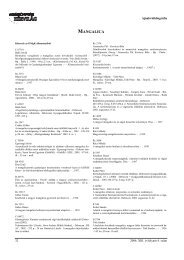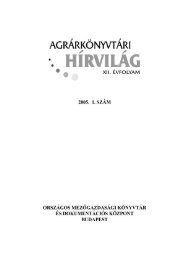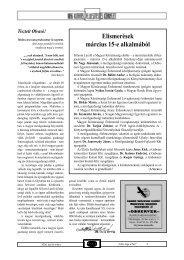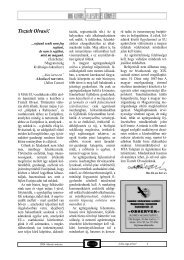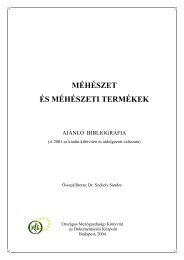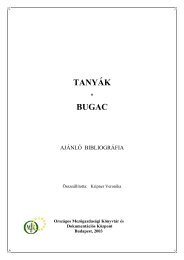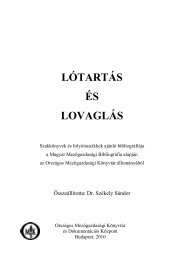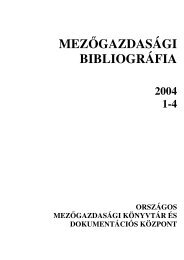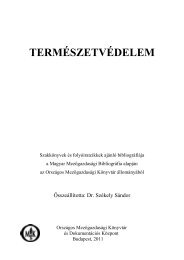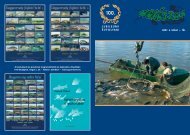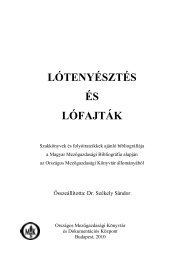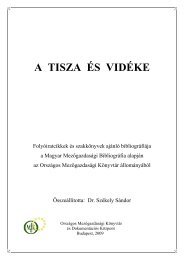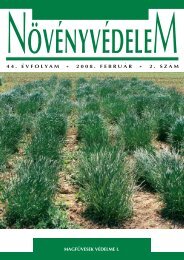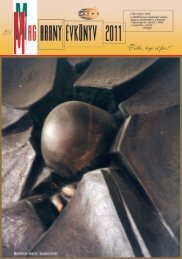hUNGARiAN AGRicUltURAl RESEARch
hUNGARiAN AGRicUltURAl RESEARch
hUNGARiAN AGRicUltURAl RESEARch
You also want an ePaper? Increase the reach of your titles
YUMPU automatically turns print PDFs into web optimized ePapers that Google loves.
NEWS & EVENTS • NEWS & EVENTS • NEWS & EVENTS • NEWS & EVENTS • NEWS & EVENTS • NEWS & EVENTS<br />
From page 2<br />
Plant species<br />
• bred at the company currently as well<br />
• winter and spring types of bread and durum<br />
wheat, barley, triticale and oats; and winter rye;<br />
• corn, grain sorghum, silage sorghum and<br />
Sudan grass;<br />
• sunflower, winter rapeseed, soybean, linseed,<br />
millet, Hungarian millet and buckwheat;<br />
• under the variety ownership of the company<br />
• broomcorn, onion, garlic, peanut, castor oil<br />
plant, pumpkin and amaranth.<br />
Main spheres of activity<br />
• Conventional breeding is an efficient tool to<br />
breed cultivars presenting good quality, high<br />
yield, disease and pest resistance, drought<br />
tolerance and winter hardiness, and to develop<br />
a range of cultivars to be used as food, feed,<br />
and bioenergy sources or industrial crops.<br />
• The applied research work done at the<br />
company has resulted in 85 PVPs, patents, and<br />
19 pending patents, respectively, giving a<br />
chance to implement biological progress in<br />
agriculture. 39 variety candi dates and<br />
experimental hybrids are being tested in the<br />
domestic official trials of the Central<br />
Agricultural Office and 27 abroad (in 7<br />
countries).<br />
• Research in plant physiology, phyto pathology,<br />
biotechnology, molecular biology, tissue<br />
culture, the assessment of grain composition<br />
and analytical tests enhance the realization of<br />
breeding goals.<br />
• Production technological researches, such as<br />
long-term fertilization trials, chemical plant<br />
protection experiments (application of<br />
fungicides, herbicides and insecticides) are<br />
carried out to support sustainable agriculture<br />
and environmental protection. The results<br />
reflect reliably the response of new stocks,<br />
lines, plant varieties and hybrids and the<br />
efficacy of chemicals. Based on the results,<br />
our research workers elaborate the variety<br />
specific intensive, semi-intensive, organic and<br />
precision crop production technologies for<br />
various soil types.<br />
• The quality parameters of F1 hybrid seed,<br />
basic seed, and first and second grade certified<br />
seed produced at our seed plants are excellent.<br />
The seed conditioning is assured by the ISO<br />
9001:2001 standard.<br />
• Dietetic and diabetic food products and<br />
recipes have been developed at the company<br />
influencing beneficially the life quality of<br />
patients having certain alimentary diseases.<br />
The dietetic product family FE-MINI involves<br />
23 gluten-free food products with low protein and<br />
phenylalanine content for patients suffering from<br />
celiac disease, renal failure or phenylketonurea<br />
(PKU).<br />
The diabetic baking and farinaceous industrial<br />
product family DIABET-MIX (a joint patent with<br />
Diabet Trade Ltd.) includes flour and additive<br />
mixtures, bread and noodles for diabetic patients<br />
and people wishing to lose weight.<br />
Sites where breeding work is done<br />
Breeding work is realized in a proper<br />
integration at the headquarters in Szeged,<br />
research station in Táplánszentkereszt, and five<br />
minor research stations (Kiszombor, Fülöp -<br />
szállás, Kiskundorozsma, Szeged-Öthalom,<br />
Szeged-Kecskéstelep).<br />
These locations represent various climatic<br />
conditions, soil types and other environmental<br />
factors in Hungary. The breeding work and the<br />
selection at these locations has allowed the<br />
improvement of plant varieties with broad<br />
adaptability and their seed production in top<br />
quality. Field trials and breeder’s seed<br />
multiplication can be accomplished on 1700<br />
hectares of land (mainly in Kiszombor-Dénes -<br />
major) at own management.<br />
Company history<br />
The decision to establish the company in 1904<br />
was followed by laying its corner stone in 1914,<br />
and its opening in 1924. The research work<br />
started as a matter of fact on 26th October 1924.<br />
The legal predecessors of Cereal Research<br />
Non-Profit Ltd. (2009) were:<br />
• Royal Hungarian Lowland Agricultural<br />
Institute (1924–1949)<br />
• Agricultural Experimental Institute of Szeged<br />
(later: of South Lowland) (1950–1969)<br />
• Cereal Research Institute (1970-1997)<br />
• Cereal Research Non-Profit Company<br />
(1997–2008)<br />
38 Hungarian Agricultural Research 2009/3–4



